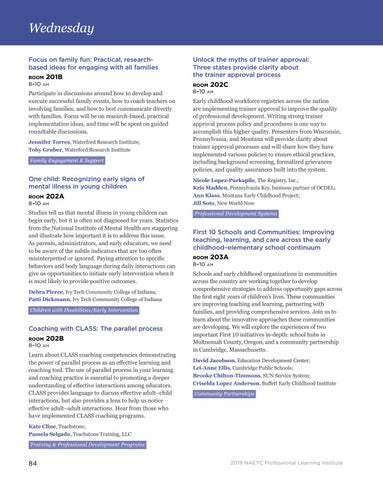Wednesday Focus on family fun: Practical, researchbased ideas for engaging with all families room
8–10
201B
am
Participate in discussions around how to develop and execute successful family events, how to coach teachers on involving families, and how to best communicate directly with families. Focus will be on research-based, practical implementation ideas, and time will be spent on guided roundtable discussions. Jennifer Torres , Waterford Research Institute; Toby Gruber , Waterford Research Institute Family Engagement & Support
One child: Recognizing early signs of mental illness in young children room
8–10
202A
am
Studies tell us that mental illness in young children can begin early, but it is often not diagnosed for years. Statistics from the National Institute of Mental Health are staggering and illustrate how important it is to address this issue. As parents, administrators, and early educators, we need to be aware of the subtle indicators that are too often misinterpreted or ignored. Paying attention to specific behaviors and body language during daily interactions can give us opportunities to initiate early intervention when it is most likely to provide positive outcomes. Debra Pierce , Ivy Tech Community College of Indiana; Patti Dickmann , Ivy Tech Community College of Indiana Children with Disabilities/Early Intervention
Coaching with CLASS: The parallel process room
8–10
202B
am
Learn about CLASS coaching competencies demonstrating the power of parallel process as an effective learning and coaching tool. The use of parallel process in your learning and coaching practice is essential to promoting a deeper understanding of effective interactions among educators. CLASS provides language to discuss effective adult–child interactions, but also provides a lens to help us notice effective adult–adult interactions. Hear from those who have implemented CLASS coaching programs.
Unlock the myths of trainer approval: Three states provide clarity about the trainer approval process room
8–10
202C
am
Early childhood workforce registries across the nation are implementing trainer approval to improve the quality of professional development. Writing strong trainer approval process policy and procedures is one way to accomplish this higher quality. Presenters from Wisconsin, Pennsylvania, and Montana will provide clarity about trainer approval processes and will share how they have implemented various policies to ensure ethical practices, including background screening, formalized grievances policies, and quality assurances built into the system. Nicole Lopez-Purkapile , The Registry , Inc.; Kris Madden , Pennsylvania Key , business partner of OCDEL; Ann Klass , Montana Early Childhood Project; Jill Soto , New World Now Professional Development Systems
First 10 Schools and Communities: Improving teaching, learning, and care across the early childhood–elementary school continuum room
8–10
203A
am
Schools and early childhood organizations in communities across the country are working together to develop comprehensive strategies to address opportunity gaps across the first eight years of children’s lives. These communities are improving teaching and learning, partnering with families, and providing comprehensive services. Join us to learn about the innovative approaches these communities are developing. We will explore the experiences of two important First 10 initiatives in-depth: school hubs in Multnomah County, Oregon, and a community partnership in Cambridge, Massachusetts. David Jacobson , Education Development Center; Lei-Anne Ellis , Cambridge Public Schools; Brooke Chilton-Timmons , SUN Service System; Criselda Lopez Anderson , Buffett Early Childhood Institute Community Partnerships
Kate Cline , Teachstone; Pamela Selgado , Teachstone Training , LLC Training & Professional Development Programs
84
2019 NAEYC Professional Learning Institute
